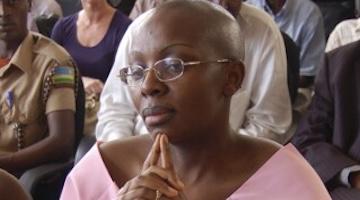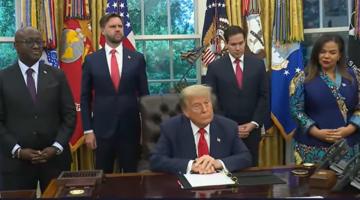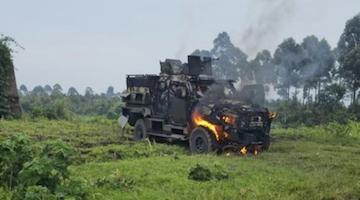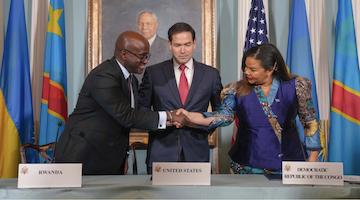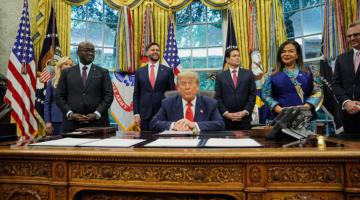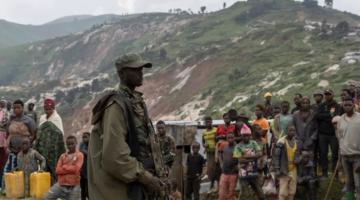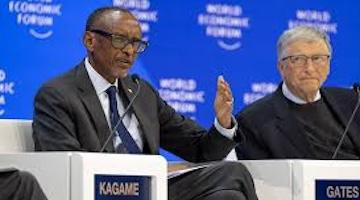President George W. Bush meets with President Yoweri Museveni of Uganda Friday, July 11, 2003 in Entebbe, Uganda. (Photo: georgewbush-whitehouse.archives.gov)
The US backed Ugandan government is responsible for looting the Democratic Republic of Congo's resources. They owe a debt but the crime was carried out with help from the US and UK governments and corporate interests in both countries.
This article was originally published in Covert Action Magazine.
In February, the International Court of Justice (ICJ) ruled that Uganda must pay $325 million in reparations to the Democratic Republic of Congo (DRC) for its role in conflicts in Congo’s resource-rich Ituri province from 1998 to 2003.
The amount includes $225 million to be paid for “loss of life and other damages to persons” that included rape, conscription of child soldiers and the displacement of up to 500,000 people.
The ICJ added another $40 million for damage to property and $60 million for damage to natural resources, including the plundering of gold, diamonds, timber and other goods by Ugandan forces or rebels they supported.
The $325 million sum falls well short of the $11 billion that Congo had demanded.
For true justice to be achieved, Uganda’s foreign backers—including especially the U.S.—should also be held liable for significant reparations payments and be indicted criminally.
Ugandan Invasion and Plunder of the Congo
Uganda first invaded the DRC in 1996 with Rwanda in order to replace the DRC’s ailing leader Joseph Mobutu Sese Seko with Laurent Kabila, a former guerrilla fighter and diamond smuggler who would help Uganda and other foreign powers access the country’s rich mineral wealth.
In 1997, gold and gold compounds plundered from the DRC became Uganda’s second largest source of export earnings.
In 1998, after Museveni claimed that Kabila was failing to provide security along Uganda’s border, Ugandan troops invaded the DRC again and helped install a new puppet, Hyppolite Kanambe (aka Joseph Kabila).
The Wall Street Journal had reported that Kabila’s nationalizations “sent a worrying signal … to foreign companies that are eager to do business in this mineral-rich country.”
Between 1999 and 2003, Uganda and its proxy militias controlled Congo’s Ituri region, home to some of the richest gold and diamond deposits on earth, as well as coltan.
During this period, some 50,000 Iturians were killed and half a million displaced while the Ugandans and their allies “looted property, committed murders, and grabbed land,” in the words of journalist Helen C. Epstein. Villagers were raped, and herded into churches and burned alive.
The UN Security Council reported that General James Kazini, the commander of the Ugandan Army, looted timber and conspired with a Ugandan militia leader, Ernest Wamba dia Wamba, to seize 200 tons of coffee beans in the Équateur region.
President Museveni’s half-brother, Salim Saleh, and his wife, Jovia Akandwanaho, took charge of the exploitation of diamonds while setting up a private air-transport company to ship illicit natural resources back into Uganda.
In total, Uganda is estimated to have plundered at least $10 billion in Congo’s mineral wealth.
Emma Bonino, European Commissioner for Humanitarian Aid, spoke of “incomprehensible carnage” and accused the invaders (Uganda and Rwanda) of having transformed the entire region into a “slaughterhouse.”
U.S. Complicity in “Africa’s First World War”
From the beginning, the U.S. and Great Britain were key sponsors of the Rwandan-Ugandan invasion of Congo, “Africa’s First World War.”
Ugandan troops received extensive funding through Bill Clinton’s African Crisis Response Initiative (ACRI), a $10-20 million per year initiative inaugurated in 1996.
With the approval of the Clinton administration, the Pentagon and CIA provided more than $10 million in arms to Uganda as well as Rwanda, including through a CIA-run airline, Mountain, which helped evacuate wounded soldiers, and installed a command and communications center in Kigali and in the coastal areas of Uganda to help support them.
The National Security Agency (NSA) supplied portable encrypted Motorola satellite phones from which Rwandan and Ugandan military commanders could receive advice and intelligence from the U.S. government and CIA-provided satellite imagery of refugee movements, some of it free of charge, through defense contractor Bechtel.
U.S. Special Forces and private contractors, such as Military Professional Resources Inc. (MPRI), provided counterinsurgency training to Rwandan Patriotic Front (RPF) and Ugandan fighters guilty of atrocities against unarmed civilians. A senior U.S. embassy official in Kigali described the program as “killers…training killers.”
The Ugandan fighters were issued American-made uniforms and night-vision goggles. Journalist Wayne Madsen reported on a 1998 visit that he “could hardly avoid encountering uniformed and non-uniformed U.S. military personnel in the… hotels in Kampala and Kigali.”
A few Americans reportedly made incursions into Zaire and some, according to French intelligence sources, participated in massacres of Hutu refugees.
Two Green Berets were reportedly killed. French intelligence claimed that American C-130 gunships machine-gunned refugee camps, though this is difficult to corroborate.
To the Victor Goes the Spoil
As a spoil of victory, Western corporations—such as America Mineral Fields (AMF), headquartered in Hope, Arkansas, Bill Clinton’s hometown, and Barrick Gold, on whose Board sat George H.W. Bush and ex-Canadian Prime Minister Brian Mulroney—received concessions for mining mineral resources worth more than $157 billion.
AMF CEO Jean-Raymond Boulle had been a guest at Clinton’s first White House inauguration; he promoted a venture digging for diamonds in Arkansas in the 1980s when then-Governor Clinton approved Boulle’s drilling in the Arkansas state park.
The CEO of Boulle’s main investor, Sanford Robertson of Robertson Stephens Investment Management Company, gave hundreds of thousands of dollars to Democratic Party causes and hosted fundraisers for Clinton.
Another big beneficiary of the U.S.-Rwandan-Ugandan invasion of Congo was the copper giant Phelps Dodge Corporation, which secured ownership of the cobalt-producing Tenke Fungurume mine with the help of the U.S. embassy.
With Friends Like These
Museveni was used as an important proxy to enable the corporate plunder of the Congo. He evolved as a “darling of U.S. diplomats” in the 1990s as a result of his “style of self-reliant government, fiscal discipline and free-market economics,” according to The New York Times.
Between 1998 and 2013, Museveni’s regime received $20.5 billion in U.S. aid. Secretary of State Madeleine Albright called him “a beacon in the Central Africa region.”
Back in 1987, fresh from his triumph over socialist Milton Obote in a bloody six-year bush war, Museveni had been greeted with full honors on Capitol Hill and met with President Ronald Reagan and Vice President George H. W. Bush.
Journalist Helen Epstein wrote that, since the meeting with Reagan, Museveni “has had far more contact with high-level American and British officials than any other living African leader.”
Some company for America’s best and brightest to keep!
Jeremy Kuzmarov is Managing Editor of CovertAction Magazine. He is the author of four books on U.S. foreign policy, including Obama’s Unending Wars (Clarity Press, 2019) and The Russians Are Coming, Again, with John Marciano (Monthly Review Press, 2018). He can be reached at: jkuzmarov2@gmail.com.


